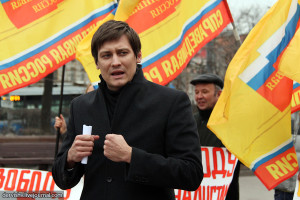Russia’s New Demographic Crisis
Russia is facing a new demographic crisis, and this one has nothing to do with declining birth rates or alcoholism. According to Russian politician Dmitry Gudkov, mass emigration is bringing to the country to “catastrophe,” asserting that “we risk losing as many people in ten, fifteen years as we gained by annexing Crimea.” Currently, political repression and a failing economy are contributing to a dramatic outflow of moderate, middle class Russians from the country, who are leaving in search of better prospects. This brain drain is bleeding Russia dry of its most educated and innovative citizens, such as young business whiz Pavel Durov, the creator of VK, Russia’s most popular social media network. Durov is only one of approximately 200,000 disillusioned young Russians who have moved away from Russia this year, and more are expected to follow.
The Russian government has recognized the severity of this problem, and is preparing to spend 1.8 million rubles in a statewide propaganda initiative to increase levels of Russian patriotism. According to a report, the initiative “should increase the proportion of Russians ‘who take pride in their country’ by eight percentage points within five years.” Whether this scientific mandate can actually manage to recapture the hearts and minds of Russia’s disillusioned citizens remains to be seen.
Russian opposition figures are among those who are emigrating. In an interview with the New York Times, Russian opposition politician Ilya Ponomarev described the hopeless position in which critics to the Putin regime often find themselves. Ponomarev described how opposition politicians have become an endangered species in Russia--those who speak out are branded as “national traitors” by state media campaigns and are primary targets for both formal and informal forms of persecution. Some, such as Alexei Navalny, and outspoken critic of the regime, are charged with trumped-up crimes, facing heavy fines and jail time. Others, such as the late Boris Nemtsov, find themselves on the hit lists of criminal or nationalist groups.
Known for being the lone dissenter in the Russian State Duma in the 445-1 vote to approve the annexation of Crimea, Ponomarev was prosecuted on charges of misappropriation of public funds and removed from office. After his assets were seized by the state, he was forced to live in exile. A self-declared Russian patriot, Ponomarev described the difficulty of his choice to remain abroad rather than return to Russia, where he would doubtless face jail time or worse. “Is it better to stay and fight from a prison cell, or to change things by applying pressure from the outside?” he mused. “It’s a question I grapple with every day.”
Ponomarev counts himself among roughly one million Russians currently abroad who have fled or been “exported” by Russia in recent years. According to Ponomarev, these “thinkers, reformers, business leaders, scientists and regular people seeking freedom” are united by their love of country and their distaste for the current regime that controls it. “We are no longer in our home country, not because we don’t love it, but because the values and culture of our Motherland have changed so radically that we sought refuge in the freer countries of the West,” he explained.
However, just because people are leaving doesn’t mean that they have given up. Some opposition figures, such as multi-millionaire Mikhail Khordokovsky, are attempting to support reform in Russia from exile. Khordokovsky has funded the creation of the “Open Russia Foundation,” which aims to strengthen Russian civil society, and continues to call openly for the fall of the regime by any means necessary. With the help of 21st century communications technology, Khordokovksy has been able to maintain a formidable presence in Russia despite his exile and is considered one of Putin’s strongest political threats.
Meanwhile, not all have given up hope that meaningful reform can still be achieved in Russia from within. Nikita Andiyanov, a student of political science at St. Petersburg State University, is determined to do his part to make his community a more tolerant and progressive place. As an openly homosexual man, Nikita has been the victim of state policies that dramatically curb his freedom of expression. While he admits that friends and family have counseled him to move away “where I can be happy and have a life,” Nikita explained in a Caravel-exclusive interview that “for now I feel needed here.”
In July 2014, twenty year-old Nikita joined the Russian LGBT Network, an organization dedicated to fighting for LGBT rights. Recalling how he got involved, Nikita explained, “I came to their office and said ‘Hey, I want to help. I don’t know really what I could do to contribute, but I can speak some English and have quite a positive outlook on life. Is there something?’” Since joining the organization, Nikita has traveled to London to attend a program designed by Stonewall, the biggest LGBT organization in the UK. As a participant, Nikita and his team learned strategies for running a successful campaign and for building community allies to help his cause. Coming back from the conference, Nikita was eager to put what he had learned into practice in his own community. “I got so much inspiration and knowledge,” he said. “I feel it will be a betrayal if I leave after that.”
Thus, despite Russia’s bleak demographic situation, it would appear as though a spark of hope for reform is still alive. Whether from exile or from the local community, a vanguard of Western-oriented, patriotic Russians are still fighting to save their country, despite the oppressive politics of the regime. Keeping in mind figures from Khordokovsky to Nikita, Ponomarev said it best: “What do they have in common? They all care about Russia and they all have a global vision, ready to embrace what’s best about the West to benefit their home country… Russia’s future demands a new start-up generation that will take our country back.”

